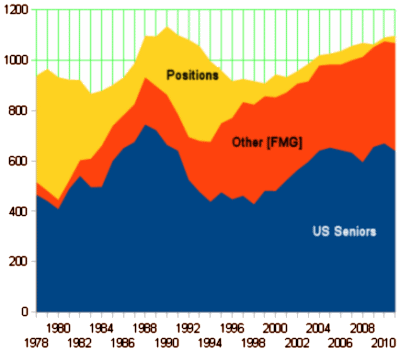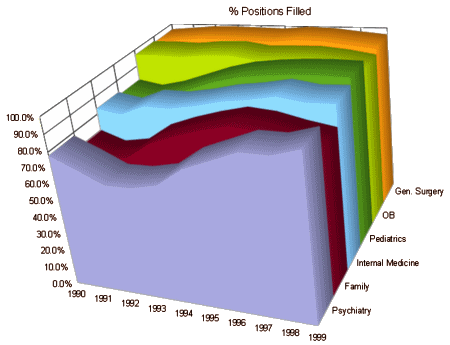APA News Release
ARLINGTON, Va. (March 27, 2012)—The number of U.S. medical students choosing psychiatry as a specialty has been declining for the past six years, according to a report from the National Resident Matching Program. The American Psychiatric Association expressed concern that this trend is occurring as the nation faces a shortage of psychiatrists. The association encourages medical schools to provide more information and training to medical school seniors to teach them that psychiatry can be a profitable and rewarding career path.“In 2010 there was a slight increase in the number of seniors choosing psychiatry, but overall the trend has been downward,” said John Oldham, M.D., president of the APA. “We need to reach out to medical students in more effective ways than simply exposing them to a four-week clerkship on an inpatient unit, with no follow-up of the patients they have cared for. Establishing and maintaining ongoing relationships with patients is one of the key factors that makes psychiatry such a fulfilling career.” Dr. Oldham said that students need to know what it is like to get to know their patients and follow their progress over time to know how rewarding the profession can be.
So far reasons for the decline in students selecting psychiatry are not well known, but James H. Scully, Jr., M.D., the APA’s Medical Director and CEO, speculated that there could be several reasons. “This is a very exciting time for psychiatry,” he said, “when we have more scientific developments in the field than ever before, but this means that the field is evolving in ways in which the outcome is unknown. It’s a great time for young doctors to have an impact on what the future of psychiatry will look like.”
Some experts have suggested that there should be more than one track to an education in psychiatry. Advances in science are leading some future psychiatrists in the direction of clinical neuroscience, whereas others would like to focus mainly on psychotherapy. Another issue that most medical students face is a large burden of student loan debt upon graduation, which puts pressure on medical students to choose more lucrative careers than psychiatry, such as surgery.
There are currently about 50,000 psychiatrists in the U.S., a number that is already inadequate to serve all the patients who need help, especially those in rural areas of the country. In fact, according to the National Institute of Mental Health, there are more than 3,500 Health Professional Shortage Areas for Mental Health, mostly in non-metropolitan areas. In addition, about half of currently practicing psychiatrists are over the age of 55 and many will soon start retiring…

I couldn’t confirm much of a falling specialty choice rate from the National Resident Matching Program figures, but I wouldn’t doubt the finding [it’s mighty flat]. I doubt this letter is going to do a lot [Duh!]. But looking over the numbers was like a trip back in time for me. I started my life in psychiatry running a psychiatric emergency room, but within a short time, I was directing a Residency Training Program. I used to jokingly call it trafficking in human flesh, because what seemed to matter the most was filling the program so we had ample residents to cover the various hospitals where the residents were placed [and paid]. I started in 1978, which, as you can see, was a down time for people choosing psychiatry. I can’t claim any credit for the upward trend during the decade that I did that job, but I did notice that it got a little easier each year.
The real measure was the number of US Seniors. That’s not a racist comment, it actually means that a program with US Seniors was chosen. Some of the best residents I had were Foreign Medical Graduates who chose psychiatry, but many of the FMG applicants were people who were primarily interested in staying in the US and not so passionate about the specialty. At least that’s the way it was then. And I had something extra on my side that helped – Atlanta Georgia was a definite designation city in the 1980s. I left in 1987-88, and didn’t much look back so I was unaware of that big dip after I left and had to be reminded that it was the time of the coming of Managed Care which was devastating to psychiatric practice. This graph compares psychiatry to several other specialties [% available positions so the dip looks smaller]:

Managed Care originally slashed reimbursement to psychiatry to eliminate long term psychotherapies and were successful in that endeavor. However, the current situation is that reimbursement usually only covers short medication visits ["the med check"]. So part of the cry for treatment reform gets tangled up in economics – anything other than "med checks" is self-pay and so one can predict the numbers choosing psychiatry will fall further. The current figure is that 80% of psychoactive drugs are currently being prescribed by Primary Care Physicians, and that figure has been rising.

Unfortunately, there has to be a negative outcome that allows a lawyer who is willing to proceed for the good of the many and not the wallet to show that insurance companies are setting the standards of care and thus assume culpability by their limiting access to standards of care set by the profession, not the bottom line of the company.
So, a colleague or colleagues will have to be screwed in the legal process, not that many who allow negative outcomes to occur are so innocent and unfairly sued in the first place, but, precedence must be set once and for all with serious consequences financially, professionally, and embarassingly.
I do take issue with you somewhat justifying that medicating is a reality. It is not as a first intervention. I stand by my premise that psychotherapy is the standard of care as first intervention for more than 50% of what comes into psychiatrists’ offices. We have just been so cowardly and manipulated to not advocate for what is right anymore. And psychiatry, as a whole, deserves the fate it faces now.
May the APA have it’s last conference of any significance and substance in Philly this year. And DSM5 be its final nail!
My own two cents: Psychiatry has become an intellectually and morally, and finally a bankrupt profession, in a relative sense. I am an old geezer, also in a relative sense ( in that my joints ache to no end when I go to the health club). When I was trained in the late 1970’s and early 1980’s (ah, so long ago), the field was vibrant. It was filled with creative thinkers. My mentors were the most intelligent and free thinking people I had ever met. They were Renaissance men and women knowledgeable in many fields– medicine, psychiatry, developmental psychology, clinical psychology,anthropology, sociology and what not. And yes, they were mostly (but not exclusively) psychoanalytically-oriented clinicians and researchers. God, did I learn a lot from them all!
The hallmark of my education was not just courses, but weekly patient rounds where a mentor would interview a patient in front of an audience of psychiatrists, psychologists, residents, PhD students, and social workers. The interview would cover presenting symptoms, psychiatric history and developmental history– the patient’s narrative autobiography if you will. The medical record was reviewed. Sometimes a brief projective test was part of the interview, like a TAT. The post-interview discussion would last an hour. We would all have lunch together afterward and continue the case discussion. It was magnificent! So intellectually rewarding and stimulating! It made me WANT and DESIRE to work in this noble field!
I am still an educator. I try to bring this wonderful approach to my current residents and students. It is a challenge. A lot has changed. Students are more a historical. Signs and symptoms a la DSM and drugs, they want to know about. I sometimes feel as though I am an Irish monk, trying to keep the flame of enlightenment alive in the midst of a kind of current Dark Age of psychiatry. That sounds grandiose but it is decidedly not.
Psychiatry needs to bring back the mind in its neuroscientific discussions of the brain. An individuals life and history, choices made and not made, circumstances of their choosing and those imposed arbitrarily and capriciously, conflicts, conscious and unconscious, and whatnot have to be part of any clinical discourse in order to understand (and treat) pain and yes, even psychosis.
I just don’t see this happening much in this day and age. And maybe that is one reason bright medical students (in addition to the financial issues) don’t regard Psychiatry as a prized career. But, as I said, I am an old geezer. But this old (and creaky and cranky) geezer is thankful that 1Boring Old Man is doing his part to right the HMS Psychiatry ship in the face of the swell of compromised KOL’s who have capsized our profession.
And I apologize for my rant.
Tom,
You’re welcome any time with that rant. Beautifully put. I wouldn’t have missed the chance for those experiences for anything. That’s why I continue to write about how it’s been corrupted and co-opted – in part, with hopes of reviving what was so good about that eclectic psychiatry you describe so well and those teachers that had learned so much about people along the way, and in part, I think writing is my way of lamenting things being lost. Psychiatry as it is today would’ve never have pulled me away from my former career [that I also liked]…
fyi jerome kagan making rounds promoting new book “psycology’s ghosts”
from transcript of interview on WBUR
http://radioboston.wbur.org/2012/03/29/psychology-ghosts
….
The problem is that biology made extraordinary advances, both in genetics and in ways to measure the brain. Because that technology is available, people rushed over to that side and hoped that that would solve the problem, abandoning the other half.
….
To put it briefly, biology says you’re likely to be vulnerable to this envelope of illnesses. Your environment, your setting, your class, your culture, where you live disposes and selects from that envelope the symptoms you might develop. And that domain is not being studied adequately.
A lot of people might think the way the research is done is one thing but psychology and therefore psychiatry have a direct impact on the lives of millions of people. In your book you write that the fifth version of the Diagnostic and Statistical Manual is due out soon; it’s the bible by which many people are diagnosed. What is it that you’re recommending that might change the impact that people feel?
To be specific about the diagnostic manual, I would hope — it’s too late now for this edition, but in the next edition, 2015 or 2016 — that the categories of mental illness, the 206 or 210, take into account what the psychiatrist seeing the patient believes is the cause.
In other words, “I think because I’ve gathered some data (some genetic data, some brain data) — I think this is due to a genetic vulnerability,†versus “I think this depression is due to the fact that this person is living under horrible circumstances, and I think they should be treated differently.â€
One brief example: Gerard Bruder in New York City has shown that there are two kinds of depressives. They look alike and they tell the psychiatrist exactly the same symptoms. But one of them has a very active left frontal lobe; they do better when you give them an antidepressant drug. Another group of patients have the same symptoms, but they’re more active in the right frontal lobe; they don’t improve on the drug. So why don’t psychiatrists when they do their diagnosis say, “I’m going to get an EEG and I’m going to find out whether you have a greater left active frontal lobe or a greater right and then I’ll decide whether I’m going to prescribe this antidepressant.â€
Tom,
Even though I’m somewhat younger than you, I was fortunate to train in a medical school in which psychiatry (and the patients it treated) were given the respect and reverence that you describe. Like you, I was drawn to this field because it represented a celebration of the human spirit more than a medical discipline. “Illnesses” were so much more than mere lists of symptoms, and each person’s “recovery” took its own unique path. I used to joke with my friends that I chose psychiatry because I could bolster my therapeutic armamentarium just as much by reading a novel or going to a museum as I would by staying at home and memorizing pathways out of a textbook.
As I’ve progressed through my training and the early years of my career, I have become thoroughly disgusted by what psychiatry has become. Creative thinking is neither rewarded nor even encouraged. “Talking with” has been replaced by “talking to,” or, most recently, “prescribing to.” Patients no longer see us as gifted, compassionate healers, but as distant, abusive pill-pushers. And as much as we like to blame the insurance companies, government regulations, and Big Pharma, we must also place blame on our leadership, and on those among us who insist– despite abundant evidence to the contrary– that this new way of doing things “works.” All too often, it most certainly does not.
Thanks Mickey and SteveBMD: I was afraid that my rant was the Maker’s Mark talking.
Listen you guys, you need to organize in a professional association to lobby for your interests in competition with all the others.
Seriously, a voting bloc does not have to be very large to take over an existing professional organization. (Cf Survivor One World.) It does have to be active, consistent, organized, and present.
WOW! Great “dialogue” here. Thanks!
http://members.beforeitsnews.com/story/1915/887/The_Problem_With_Press_Releases.html
I had a colleague tell me today that an insurance company denied a patient from getting a prescription for, sit down for this one colleagues, Prozac. When I clarified that in fact it was fluoxetine and not some other Brand name med or the patient demanding brand name Prozac, the reason was this: the patient HAD to fail a trial of Celexa or Zoloft first. Why, I asked, when generic Prozac is in fact still cheaper than Zoloft even at WalMart or Target, all my colleague said was that was the insurer’s policy. WTF!?!? There has to be some accountability to justify by a lawyer for this kind of intrusion into a physician’s prescribing habits.
Wow. And to those who support PPACA/Obamacare to the bitter end, you think this legislation would make incidents like this go away? Hey folks who fill prescriptions, prepare to reexperience what Mellaril, Haldol, and Elavil brought to the populace back in the 1970’s. Oh yeah, the correctional system has already paved the way for this to be validated!!!
Joel,
One might argue that the insurance company is not intruding into the physician’s prescribing habits (no one’s saying you can’t write a Prozac script!), but, rather, on the patient’s ability to get it. Pharmacy benefits are part of a contract between the insurance company and the patient, not the insurance company and the prescriber.
In this situation, since fluoxetine is so cheap ($10 for 90 days at Walgreens) there’s no need to use insurance anyway. But even for drugs that are pricier, it’s really the patient’s responsibility to argue for better coverage (or simply to pay out of pocket, if the treatment is truly necessary), not ours. Sure, we can lobby for our patients, but sometimes if we stop and think about what exactly we’re lobbying for, it really doesn’t make a lot of sense.
Otherwise, I agree with the overall tone of your comment. Things will not get better anytime soon.
It is the sheer gall of some faceless entity telling you as a physician what you can’t or can do and then claim complete unaccountability should the doctor foolishly follow the direction. Shielding behind the payment issue is just false cover. But, the fact that patients now think that ALL scripts should have little or no cost for them is equally absurd and annoying.